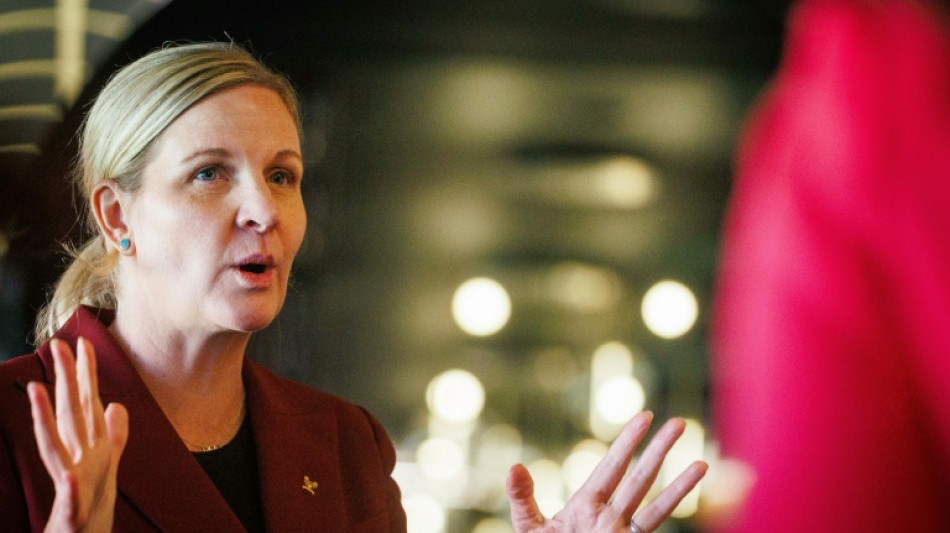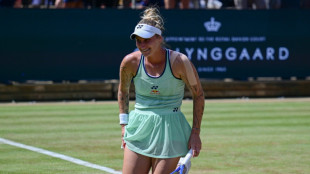

Olympic chief Kirsty Coventry's steeliness honed by hard knocks
First impressions can be deceptive but Kirsty Coventry showed that behind a sunny disposition she will have the mettle to deal with the trickiest of people and situations when she succeeds Thomas Bach as president of the International Olympic Committee (IOC) on Monday.
Looming large on the horizon of the 41-year-old Zimbabwean -- the first woman and African to occupy the post of the most powerful single figure in sport -- is US President Donald Trump.
With Los Angeles hosting the 2028 Olympics, Trump will feature often on Coventry's agenda.
Trump has not been shy in giving public dressing downs to world leaders -- notably Ukrainian President Volodymyr Zelensky and his South African counterpart Cyril Ramaphosa.
Judging by Coventry's initial response, after a crushing first-round victory in the presidential election in March, she may have Trump's measure.
"I have been dealing with, let's say, difficult men in high positions since I was 20 years old," she said, adding "communication will be key."
Unlike Trump, though, Coventry embraces the word failure, for it helped forge her stellar career.
"Everything's scary. Embrace that. You have to fail," Coventry told the swimming team at her American alma mater Auburn University last year.
"I've learned the best lessons by failing, and I have failed at many things. Life has a really good way of humbling you."
At the same time that steely resolve comes to the surface when winning is at stake.
"I was banned from playing card games with the family, because they didn't like to deal with me when I lost," she said.
A glance at Coventry's CV suggests failure in her life has been relative.
Coventry, who had the Olympic rings tattooed on a leg after her first Games in 2000, is a two-time Olympic gold medallist and she has contributed seven of Zimbabwe's overall Games medals tally of eight.
She has accrued domestic political experience, as she was Zimbabwe's Minister for Youth, Sport, Arts and Recreation from 2019 to this year.
That attracted some flak as she was serving in a government whose election in 2023 was declared to be "neither free nor fair" by the International Commission of Jurists (ICJ).
"I don't think you can stand on the sidelines and scream and shout for change," she said in her defence.
"I believe you have to be seated at the table to try and create it."
Her record as a minister has been heavily criticised by the Zimbabwean arts community in particular.
Zimbabwean President Emmerson Mnangagwa, whose predecessor Robert Mugabe labelled Coventry "a golden girl" and awarded her $100,000 after she came back with a gold medal from Beijing in 2008, hit back.
"Whoever was not impressed by her can appoint someone else when they become president," said the 82-year-old.
- 'Very hard times' -
In 2004, Coventry gave an insight into why she would later accept such a poisoned chalice and how whites in Zimbabwe have to perform a delicate balancing act.
"Zimbabwe is my home," she said after returning to a heroine's parade after winning her first gold medal at the Athens Olympics.
"It's where I was born. It's my culture. I will always represent Zimbabwe. Colour doesn't matter to me.
"I think every country goes through bad years and good years."
Coventry had a largely urban upbringing. Her parents Rob and Linn owned a chemicals firm in a suburb of Harare, but the farming evictions -- where predominantly white farm owners were forced off their lands in their early 2000s -- affected her too.
"I have had very close family members and friends on farms who have gone through very hard times," said Coventry.
Away from the controversies she has shown decisive leadership in dealing with Zimbabwean football chiefs and FIFA.
She backed the government body Sports and Recreation Commission (SRC) when it suspended the Zimbabwean Football Association (ZIFA) over allegations of fraud and sexual harassment of referees.
FIFA has a zero tolerance policy of political interference in its associations and barred Zimbabwe from international football in February 2022.
However, by September the same year they were back in the fold. A ZIFA official was later banned for five years for sexually harassing three female referees.
Coventry said in 2023 that the process had been "hard, but it was worth it, to have a way forward that's going to benefit us as a country".
Those tempted to mess with Coventry in the years to come have been duly warned.
Y.Fady--CdE



